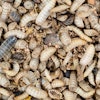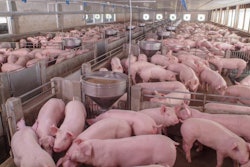
African swine fever is among the key factors bringing about one of the largest monthly rises in global meat prices.
Global meat prices increased 4.6% in November from the previous month. This is the largest monthly rise for more than 10 years, according to the United Nations’ Food and Agriculture Organization (FAO).
Compared with the 2002-04 average of 100 points, the FAO Meat Price Index reached 190.5 points in November. Although still below the peak in August of 2014, the November 2019 figure is 17% higher than 12 months previously.
Prices of all meats firmed from month before, according to FAO. It says demand is strong ahead of festivities at the end of the year, and surplus supplies for export are limited. This applies particularly to the pork market in China, where domestic production has been significantly reduced by African swine fever (ASF).
High meat prices are among the factors that pushed up the overall FAO Food Price Index. In November, this stood at 177.2 points — 2.7% up on the previous month, and 9.5% above the level one year ago.
From China, the wholesale price of pork is reported to have doubled between August and November.
New outbreaks of ASF in Asian wild boar
The only countries in Asia to have officially reported new cases of ASF to the World Organisation for Animal Health (OIE) during the past week are Russia and South Korea, and these were in wild boar. No outbreaks have been recorded in domestic pigs.
In Russia, one wild boar tested positive for the disease in a forest in Primorsky krai in the Far Eastern federal district in early December.
Since confirming the first case of ASF in September, outbreaks of ASF in South Korea remain confined to the country’s northernmost provinces that border the Democratic People’s Republic of Korea.
Over the past week, South Korea’s agriculture ministry has reported four new cases of the disease in wild boar to the OIE. All were found in Gyeonggi province in the border area — two in Paju city region, and two in Yeoncheon county.
Since August 2018, ASF has been confirmed in 12 Asian countries (including Hong Kong and Russia’s Far East), according to the OIE.
ASF situation in European domestic pigs
Up to December 1, there have been 1,842 confirmed outbreaks of ASF among domestic pigs in Europe so far in 2019, according to the European Commission (EC).
From this source, by far worst affected has been Romania (1,662 outbreaks). Poland has had 48, Bulgaria and Ukraine 41, Lithuania 19, the Republic of Serbia 18 and Slovakia 11. There was one outbreak in Italy and one in Latvia, earlier in the year. EC figures do not include cases in Moldova or Russia.
The only European state reporting ASF in domestic pigs to the OIE in the past week was the Republic of Moldova. The disease was confirmed in a third backyard herd in the central district of Hincesti. The presence of the virus was confirmed after two of the 31 pigs died.
More cases in Polish wild boar
Over the past week, Poland has reported the most wild boar affected by ASF to the OIE. A total of 126 wild boar tested positive for the virus between August 5 and September 10, according to the official reports. While a majority of these cases were in previously affected eastern provinces, the first cases have now been confirmed in the southeastern province of Podkarpackie.
The agriculture ministry in Warsaw has not yet confirmed to the OIE further ASF cases in wild boar in the west of the country. However, the minister has announced that 21 wild boar have been found dead near to the German border, reports RFD-TV.
Polish authorities have extended a fence designed to protect domestic pigs near the city of Poznan. Hunters in the area have been instructed to shoot wild boar, and the army is collecting carcasses, according to the report. Earlier this year, hunters dispatched 270,000 wild boar is eastern Poland.
Also reporting new ASF cases in wild boar to the OIE over the past week were Hungary (89 animals), Latvia (25), and western Russia (13).
ASF cases in European wild boar exceed 5,600 this year
This year, there have been 5,605 confirmed outbreaks of ASF among European wild boar up to December 1, according to the EC. That figure is has increased by 84 from the previous week’s report.
Poland has reported the most outbreaks (2,091), followed by Hungary (1,384), Romania (609), Belgium (481), Lithuania (435), Latvia (342), Bulgaria (116) and Estonia (77). Other European states reporting some outbreaks in wild boar during 2019 — but with fewer than 50 animals affected — are Italy, Slovakia and Ukraine.
View our continuing coverage of the African swine fever outbreak.

















